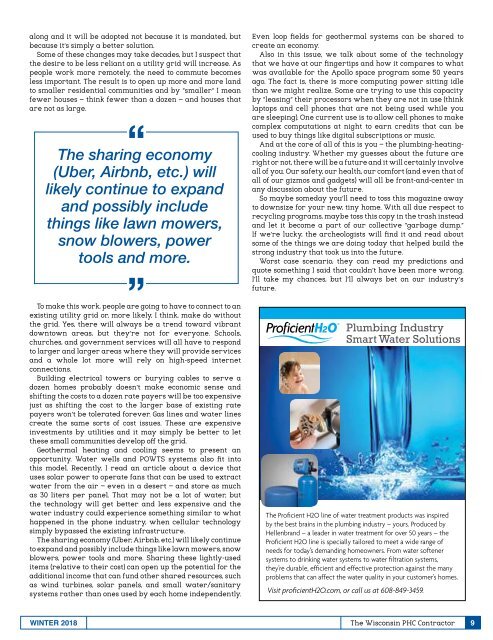Wisconsin PHC Contractor Winter 2018
Create successful ePaper yourself
Turn your PDF publications into a flip-book with our unique Google optimized e-Paper software.
along and it will be adopted not because it is mandated, but<br />
because it’s simply a better solution.<br />
Some of these changes may take decades, but I suspect that<br />
the desire to be less reliant on a utility grid will increase. As<br />
people work more remotely, the need to commute becomes<br />
less important. The result is to open up more and more land<br />
to smaller residential communities and by “smaller” I mean<br />
fewer houses – think fewer than a dozen – and houses that<br />
are not as large.<br />
The sharing economy<br />
(Uber, Airbnb, etc.) will<br />
likely continue to expand<br />
and possibly include<br />
things like lawn mowers,<br />
snow blowers, power<br />
tools and more.<br />
To make this work, people are going to have to connect to an<br />
existing utility grid or, more likely, I think, make do without<br />
the grid. Yes, there will always be a trend toward vibrant<br />
downtown areas, but they’re not for everyone. Schools,<br />
churches, and government services will all have to respond<br />
to larger and larger areas where they will provide services<br />
and a whole lot more will rely on high-speed internet<br />
connections.<br />
Building electrical towers or burying cables to serve a<br />
dozen homes probably doesn’t make economic sense and<br />
shifting the costs to a dozen rate payers will be too expensive<br />
just as shifting the cost to the larger base of existing rate<br />
payers won’t be tolerated forever. Gas lines and water lines<br />
create the same sorts of cost issues. These are expensive<br />
investments by utilities and it may simply be better to let<br />
these small communities develop off the grid.<br />
Geothermal heating and cooling seems to present an<br />
opportunity. Water wells and POWTS systems also fit into<br />
this model. Recently, I read an article about a device that<br />
uses solar power to operate fans that can be used to extract<br />
water from the air – even in a desert – and store as much<br />
as 30 liters per panel. That may not be a lot of water, but<br />
the technology will get better and less expensive and the<br />
water industry could experience something similar to what<br />
happened in the phone industry, when cellular technology<br />
simply bypassed the existing infrastructure.<br />
The sharing economy (Uber, Airbnb, etc.) will likely continue<br />
to expand and possibly include things like lawn mowers, snow<br />
blowers, power tools and more. Sharing these lightly-used<br />
items (relative to their cost) can open up the potential for the<br />
additional income that can fund other shared resources, such<br />
as wind turbines, solar panels, and small water/sanitary<br />
systems rather than ones used by each home independently.<br />
Even loop fields for geothermal systems can be shared to<br />
create an economy.<br />
Also in this issue, we talk about some of the technology<br />
that we have at our fingertips and how it compares to what<br />
was available for the Apollo space program some 50 years<br />
ago. The fact is, there is more computing power sitting idle<br />
than we might realize. Some are trying to use this capacity<br />
by “leasing” their processors when they are not in use (think<br />
laptops and cell phones that are not being used while you<br />
are sleeping). One current use is to allow cell phones to make<br />
complex computations at night to earn credits that can be<br />
used to buy things like digital subscriptions or music.<br />
And at the core of all of this is you – the plumbing-heatingcooling<br />
industry. Whether my guesses about the future are<br />
right or not, there will be a future and it will certainly involve<br />
all of you. Our safety, our health, our comfort (and even that of<br />
all of our gizmos and gadgets) will all be front-and-center in<br />
any discussion about the future.<br />
So maybe someday you’ll need to toss this magazine away<br />
to downsize for your new, tiny home. With all due respect to<br />
recycling programs, maybe toss this copy in the trash instead<br />
and let it become a part of our collective “garbage dump.”<br />
If we’re lucky, the archeologists will find it and read about<br />
some of the things we are doing today that helped build the<br />
strong industry that took us into the future.<br />
Worst case scenario, they can read my predictions and<br />
quote something I said that couldn’t have been more wrong.<br />
I’ll take my chances, but I’ll always bet on our industry’s<br />
future.<br />
Plumbing Industry<br />
Smart Water Solutions<br />
The Proficient H2O line of water treatment products was inspired<br />
by the best brains in the plumbing industry – yours. Produced by<br />
Hellenbrand – a leader in water treatment for over 50 years – the<br />
Proficient H2O line is specially tailored to meet a wide range of<br />
needs for today’s demanding homeowners. From water softener<br />
systems to drinking water systems to water filtration systems,<br />
they’re durable, efficient and effective protection against the many<br />
problems that can affect the water quality in your customer’s homes.<br />
Visit proficientH2O.com, or call us at 608-849-3459.<br />
WINTER <strong>2018</strong><br />
The <strong>Wisconsin</strong> <strong>PHC</strong> <strong>Contractor</strong><br />
9


















